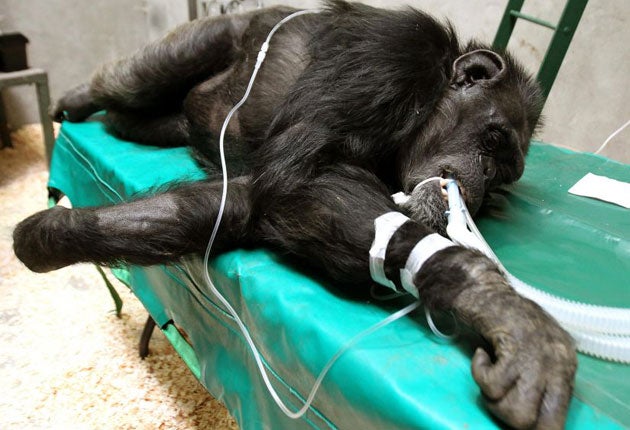Zoo to breed chimpanzees despite cruelty warning

Your support helps us to tell the story
From reproductive rights to climate change to Big Tech, The Independent is on the ground when the story is developing. Whether it's investigating the financials of Elon Musk's pro-Trump PAC or producing our latest documentary, 'The A Word', which shines a light on the American women fighting for reproductive rights, we know how important it is to parse out the facts from the messaging.
At such a critical moment in US history, we need reporters on the ground. Your donation allows us to keep sending journalists to speak to both sides of the story.
The Independent is trusted by Americans across the entire political spectrum. And unlike many other quality news outlets, we choose not to lock Americans out of our reporting and analysis with paywalls. We believe quality journalism should be available to everyone, paid for by those who can afford it.
Your support makes all the difference.A Scottish zoo is planning to start a new breeding programme for chimpanzees, in the wake of recent research suggesting that captivity drives chimps mad.
The plan for new chimpanzee breeding at Blair Drummond Safari Park near Stirling follows findings from the University of Kent showing that serious behavioural abnormalities – "some of which could be compared to mental illness in humans" – are endemic among captive chimpanzees.
The research, focusing on 40 chimps in six leading but unnamed zoos in the UK and the US, found that all the animals studied engaged in abnormal behaviour, which included self-mutilation, repetitive rocking, the eating of faeces and drinking of urine. The chimps came from many different backgrounds, and the researchers were unable to isolate any single cause, other than the one thing they all had in common – that they were in captivity.
"We suggest that captivity itself may be fundamental as a causal factor in the presence of persistent, low-level, abnormal behaviour – and potentially more extreme levels in some individuals," said the leader of the study, Nicholas Newton-Fisher, an expert in wild chimpanzee behaviour.
But the findings, published in the online science journal PLoS ONE, are not deterring the Blair Drummond Safari Park, which already has chimpanzees Chippy and his half-sister Rosie, born there 23 years ago, and wishes to bring in a new female in the hope that she and Chippy will mate.
"I do not believe that captivity is inherently bad for chimpanzees," said head keeper Alasdair Gillies. "There may be individuals in captivity who do display abnormal behaviour, but I think that is likely to be a result of their background. These abnormal behaviours could be learned culturally – chimps often imitate other chimps."
Mr Gillies added: "We will be pressing ahead with our breeding programme."
The Blair Drummond chimps live on a large wooded island on a lake at the park. The park believes they are of the subspecies Pan troglodytes verus, the western chimpanzee, and DNA tests are being carried out to establish this.
"They are quite rare, with not many in zoos in Europe," said the park manager, Gary Gilmour. "If it turns out that they are western chimpanzees, it would be very important from a conservation and breeding point of view. With around 30,000 left in the wild, and with deforestation in their habitat, and chimps being killed for bush meat and also taken for the pet trade, numbers are still decreasing, so we have to have stable groups in captivity for the future."
However, the Kent research conducted by Dr Newton-Fisher and Lucy Birkett concludes that abnormal behaviour is endemic in all captive chimpanzees.
"It is very difficult to reintroduce chimps into the wild, which leaves questions over the usefulness of captive breeding programmes," Dr Newton-Fisher said. "There are limited resources in chimp conservation, and what efforts are made should be focused on Africa, and stabilising wild populations."
Will Travers, CEO of the Born Free Foundation, said there were difficulties with keeping all primates in zoos.
"The confines and artificiality of captivity can impose serious and negative welfare burdens on them resulting in stereotypic behaviour, heightened aggression, institutional boredom, and even self-mutilation," he said.
Join our commenting forum
Join thought-provoking conversations, follow other Independent readers and see their replies
Comments